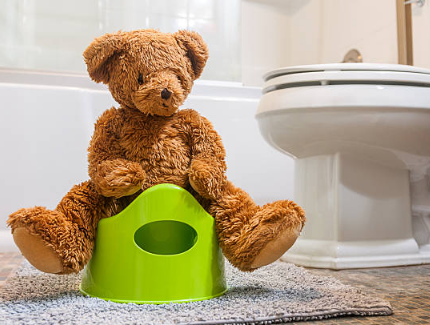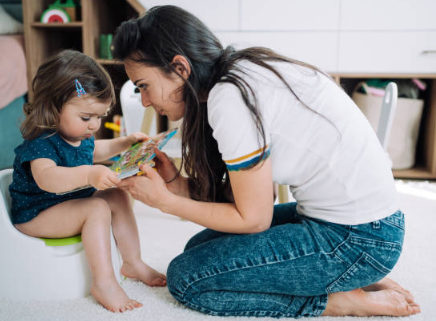Trying to figure out when to start potty training can seem daunting, but when your child is truly ready, there’s nothing to worry about. “Life goes on, and one day your child will do it,” said Lisa Asta, MD, clinical professor of pediatrics at the University of California, San Francisco and spokesperson for the American Academy of Pediatrics (AAP).
Still, most parents still have a lot of questions about giving up diapers. One of the biggest questions: when should you start potty training? Every child’s answer is different. Read on for some expert-approved advice.

What Is the Average Age to Start Potty Training?
There is no one-size-fits-all timeline for when to start potty training. “When children want to go to the toilet, they go to the toilet. Sometimes this happens at 18 months of age, and sometimes it doesn’t happen until it’s close to 4 years old,” says Dr. Asta.
But most children usually start potty training between 18 and 30 months. And, according to the American Academy of Pediatrics (AAP), in the United States, the average age to start potty training is 2 to 3 years old.
What Are the Signs of Starting Potty Training?
The following signs may indicate that your child is ready to start potty training:
- Your child stays dry for at least two hours during the day and after napping
- They can follow multi-step instructions, such as a request to walk to the bathroom, sit down, and take off their clothes
- They are interested in wearing “big kid” underwear
- Your child knows when the diaper is wet, and when the diaper gets dirty, they will cry, fuss, or show other noticeable discomfort
- They indicate through their facial expressions, posture, or language that it’s time to go to the toilet
How to Start Potty Training?
Once you’ve figured out when to start potty training, it’s important to do potty training correctly. These tips can help you transition from diapers to toilets with ease.
Step-by-Step Introduction to Toilets
Start talking about potty training occasionally around your child’s first birthday to spark interest. One way to do this is to read some children’s books about potty training with your child.
You can also bring up the topic of potty in the conversation. For example, something like “I want to know if Elmo (or your child’s favorite stuffed animal) needs to go to the toilet” or “I have to pee.” I’m going to the toilet. Incorporating conversations about using the restroom can increase your child’s awareness of going to the toilet and keep your child comfortable with the overall concept before they are ready for potty training.
Follow a Potty Training Schedule
Routine is important when you start potty training. Wendy Sue Swanson, M.D., a pediatrician at Seattle Children’s Hospital, said, “The key is to have time throughout the day to use the potty so it becomes a Xi.” Consider having your child sit on the potty every few hours, whether they have to go or not. First thing in the morning, before leaving the house, before napping, and bedtime are all good times to get your child to sit on the toilet.
Tell them to take off their shorts or trousers first, then their underwear or diapers, and sit on the toilet for a few minutes (more if you think they need to poop). Then, read a book or play a game, like 20 Questions, to let the time go in a fun way.

Give Praise and Rewards
When you start potty training, accidents are part of the process. Some children still have accidents when they reach the age of 5 or 6, and many children don’t stay dry at night until this age (or even later). Never punish your child for getting their pants wet or soiled; They are just learning and Xi, but they can’t do anything about it. Instead, give encouragement, gentle praise, or maybe even a small reward when your child is successfully using the potty.
You may want to use sticker charts – your child will receive a sticker every time they go to the toilet; When they win three stickers, they get a small prize. “But don’t go crazy!” Scott J. Goldstein, MD, clinical instructor in pediatrics at Northwestern University Feinberg School of Medicine, said. “Many young children react to excessive praise in the same way they react to punishment – feeling scared and avoiding doing things they have been overpraised or punished.”
Teach Proper Hygiene
Let your child develop good bathroom hygiene habits that will last a lifetime – handwashing should be a habit from day one. After using the potty, have your child wipe, rinse and wash their hands, whether they have been on the potty or not.
The Centers for Disease Control and Prevention (CDC) recommends moistening your hands with cool or lukewarm water, lathering with soap, and scrubbing for at least 20 seconds. Make handwashing fun by buying colorful, kid-friendly soaps; Sing your favorite song twice (e.g.,”Happy Birthday to You” or “ABC Song”) to wash your hands long enough so that the bubbles work their antibacterial magic.
Understand That Potty Training Takes Time and Effort
You may want to end your potty training as soon as possible, and maybe you’re curious about the three-day potty training trend. Experts say it’s all well and good, but if it gets too frustrating, it’s not going to work.
“I often see parents boast that they train their two-year-olds on weekends and then say that their children have four accidents a day,” Dr. Goldstein said. “It’s not the same as potty training. When children are really ready, they usually start going to the toilet on their own.”
In addition, it is not uncommon for children who have been successfully using the potty for a few days to say they want to return to diapers. You may agree to take short breaks to avoid power struggles or situations where your child starts to suppress bowel movements, which can lead to constipation. But try to make a recovery plan and ask your child, “Do you want to wear underwear when you want to get up or wait until after lunch?” ”
When to Postpone Potty Training
Experts say that even if your child looks ready, avoid potty training during transitions or stressful times. For example, if you’re moving, on vacation, have a new baby in your home, start new childcare, or are going through a divorce, postpone potty training until about a month after the transition. Children who try to learn this new skill Xi do their best if they relax and do it regularly. When in doubt, ask your healthcare provider about the best time to train your child to use the toilet.

